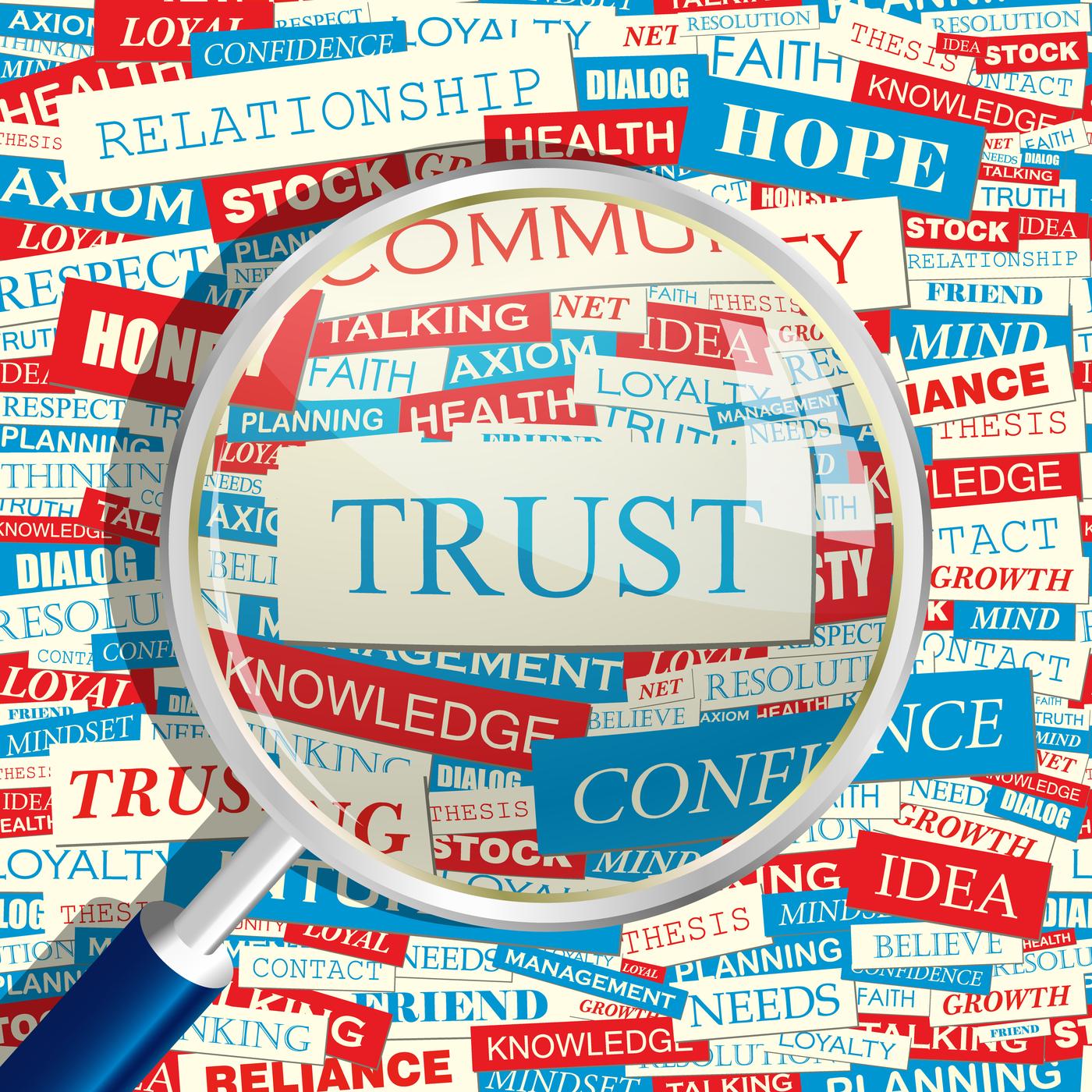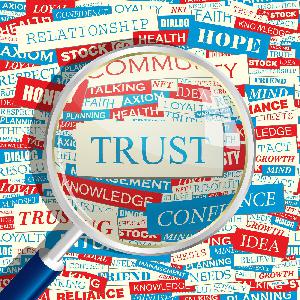Discover Got Trust? Exploring Faith and Suspicion in the 21st Century (The Takeaway)
Got Trust? Exploring Faith and Suspicion in the 21st Century (The Takeaway)

Got Trust? Exploring Faith and Suspicion in the 21st Century (The Takeaway)
Author: GBH, PRX, WNYC Studios
Subscribed: 0Played: 0Subscribe
Share
Description
Many Americans have lost trust in U.S. institutions, politicians, and the media. In a special five-part series, The Takeaway explores what it means to trust ahead of the 2016 election.
6 Episodes
Reverse
Many Americans have lost trust in U.S. institutions, politicians, and the media. In a special five-part series, The Takeaway explores what it means to trust ahead of the 2016 election. Here's what you'll find in this special podcast:
As the public watches the crisis in Flint, Michigan unfold, many Americans have begun to lose trust in their water sources, and the governmental agencies that claim it's safe. Environmental activist Erin Brockovich explores the fight for clean water.
A 2016 Gallup poll found that 73 percent of Americans trust the military. But retired Army Colonel Andrew Bacevich is worried about our nation's inability to decide on a core set of values.
Former New York Times Public Editor Margaret Sullivan reflects on the public's distrust of the American media, and how consumers choose news sources that echo their own political views.
Pulitzer Prize-winning author Liaquat Ahamed, the former head of the World Bank’s investment division, is no stranger to the intricacies of global financial markets. He examines American distrust of financial institutions, and Wall Street in particular, which he argues is a recurrent theme in this country, dating from the time of George Washington.
Radio personality and relationship guru Delilah takes a break from counseling her millions of devoted listeners to talk trust in love and relationships with The Takeaway.
In a new five part series, The Takeaway has been exploring trust in American life. In the final installment of our series, we hear from one of the most trusted voices in radio: Delilah.
She's the go-to relationship guru for 8 million weekly listeners, counseling them on everything from how to handle double-crossing boyfriends to surviving long-distance romance.
The thrice divorced mother of 13 has enough real-life experience in the world of love and relationships to easily fill an entire show, but she shared just a few minutes with The Takeaway to discuss what she’s learned about trust and relationships in our ever-changing society.
“In this world where we’ve got all this digital connection, there is a greater need than ever for honest communication," she says. "People are hungry to feel like they belong, hungry to feel connected.”
Reach out and touch someone — and tell them Delilah sent you.
Click on the 'Listen' button above to hear this interview.
In "Lords of Finance: the Bankers Who Broke the World," Liaquat Ahamed examines the events leading up to and resulted in the Great Depression by taking a look at the lives and histories of the four men who led the world's most powerful economies during that period.
Published just months after the 2008 collapse of Lehman Brothers, the subsequent financial crisis, and worst recession in 80 years, the Pulitzer Prize-winning book offers prescient insights into the murky world of big finance — then and now.
Ahamed, former head of the World Bank’s investment division, is no stranger to the intricacies of global financial markets himself. He joins The Takeaway to examine American distrust of financial institutions, and Wall Street in particular, which he argues is a recurrent theme in this country, dating from the time of George Washington.
Paraphrasing Mark Twain, Ahamed noted that "a banker loans you his umbrella when it’s sunny outside and wants it back when it starts to rain," pointing out that people’s distrust of bankers stems from the fact that they are liberal with credit during good times, tightening their belts during the bad times. What's not to hate?
Click on the 'Listen' button above to hear this interview.
Long gone are the days when CBS Evening News Anchor Walter Cronkite was universally acknowledged as the "Most Trusted Man in America." Indeed, according to a June 2016 Gallup poll, just 20 percent of Americans have "a great deal" or "quite a lot" of trust in newspapers, and only 21 percent feel that way about television news.
In 2016, news consumers have a plethora of information options, but many choose to retreat to their ideological corners, says Margaret Sullivan, former public editor for The New York Times and a current columnist for The Washington Post.
According to Sullivan, many news consumers live in information echo chambers that reinforce their own political views and biases. For example, she says that a Fox News viewer rarely, if ever, tunes in to MSNBC’s coverage to get the other side’s opinion on the same story, and visa versa.
Sullivan finds this trend “worrisome” and urges news consumers to "be smart and spread their attention around more" by getting out of their news comfort zone to hear what the other side has to say.
In this wide-ranging conversation, Sullivan also examine the benefits of big data journalism and shoe-leather journalism — and why we need both more than ever. Click on the 'Listen' button above to hear our full conversation.
Click on the 'Listen' button above to hear the full interview.
Trust is a buzzword in the current political climate. During the first presidential debate on Monday, the candidates talked a lot about trustworthiness and restoring trust within American communities, especially regarding police relations. Yet, only 6 percent of Americans trust the mainstream media, and a June 2016 Gallup poll found that only 9 percent of the American public have trust and confidence in our Congress.
And yet even after the U.S. government spent trillions of taxpayer dollars on misguided wars in Iraq and Afghanistan, Americans still view the men and women who wear the uniforms favorably: The aforementioned Gallup poll found that 73 percent of Americans have a “great deal” or “quite a lot” of trust in the U.S. military.
Retired Army Colonel Andrew Bacevich, author of “America’s War for the Greater Middle East: A Military History,” says there’s a great deal of trust not only placed in the United States’ military, but among it.
“There’s a great deal of historical evidence that those bonds of trust are enhanced the closer you get to being in harm’s way,” he says.
He later adds: “Part of the allure of life in the military that many civilians can’t appreciate — and that’s okay — is to become part of an enterprise that is based on a sense of common purpose, collective purpose.”
Bacevich has seen this first hand, reflecting on his time as a cadet at the United States Military Academy West Point. “The phrase that was drummed into us was the motto … ‘Duty, Honor and Country,” he says, adding that “it ended up translating into a code, a set of values.
Bacevich believes that a lack of shared beliefs is why Americans have little trust in other major institutions.
“If we are going to have any sort of trust in society at large, there has to be that shared understanding of basic values and it doesn’t exist in America,” he says.
“At one level, we would all say that we believe in freedom,” Bacevich continues. “But ask any collection of Americans, ‘What do you mean by freedom?’ [and] you’re getting a whole bunch of different answers.”
Bacevich believes that political institutions like the White House and Congress abuse the public trust placed in the military.
“It is nothing short than a scandal that political authorities devote so little attention to examining the wars that we have been involved in, particularly in the greater Middle East,” he said.
“There’s no accountability. There’s no examination of what’s occurred or what’s likely to come next, and there’s no clear understanding of what victory would even look like,” he continues.
Bacevich speculates that there is probably a growing sense of distrust amongst the Officer Corps in political leaders.
“I hope there’s a growing awareness within the Officer Corps that this enterprise we are engaged in, whether you call it the ‘War on Terror’ or whatever, isn’t going well and that it has become mindless and counterproductive,” he says, adding that he believes the culpability for this lies in the United States political leaders.
Bacevich believes that America’s trust for men and women in uniform has meant a blank check for the White House and Congress to deploy military members all over the world.
Click on the 'Listen' button above to hear this segment.
Erin Brockovich is a household name thanks to Julia Roberts' larger-than-life portrayal of her in the eponymous 2000 film that won the actress an Oscar for bringing the California environmental and consumer advocate to life.
Brockovich took on Pacific Gas and Electric Company, which was forced to pay $333 million for contaminating the water of Hinkley, California with toxic chemicals for decades. And now 20 years later, Brockovich is still fighting on behalf of Americans affected by poisoned water.
As the public watches the crisis in Flint, Michigan unfold, many Americans have begun to lose trust in their water sources, and the governmental agencies that claim it's safe. This distrust, Brockovich says, is leading to an increased willingness to come together as a community and enact change at the local level.
"Superman's not coming," says Brockovich. She argues that Americans need to trust in ourselves and display a willingness to work with our communities to address these problems.
Check out a photo of Erin Brockovich in our studio below, and click on the 'Listen' button above to hear our full conversation with her.
Erin Brockovich in the studios of The Takeaway.
(Andres Max Salmeron for The Takeaway)





